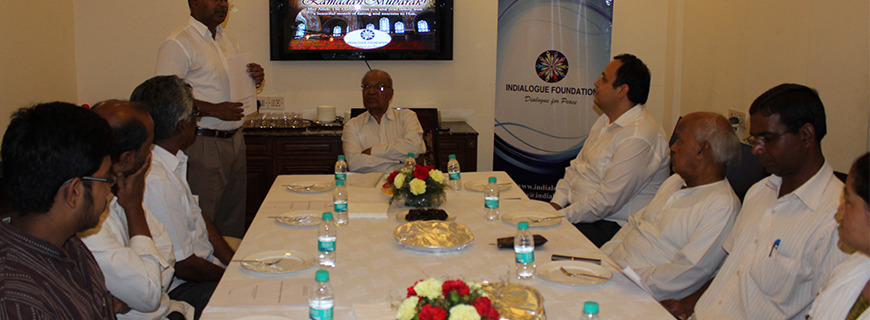By Ghulam Rasool Dehlvi,
NEW DELHI: The holy month of Ramadan has left us a few days ago in regret, disappointment and all-round gloom and doom created by the saddening news emanating from the Middle East. However, it has also left behind some beautiful moving memories and remarkable events that people from all faith traditions would love to recall and uphold. One of such harmonious memories for me was an interfaith Iftar program aimed at fostering dialogue and peaceful coexistence. During the recent Ramadan, there have been well-spirited Interfaith Iftar programs in India held by a number of religious and cultural organisations with an aim to create an environment of enhanced interfaith relations in the country.
The constructive initiatives of interfaith Iftar programs should be welcomed with good spirit.One such interfaith Iftar feast was organised by Indialogue Foundation, an institution inspired y Gulen’s teaching. Mr. Fathullah Gulen, a renowned Turkish Muslim intellectual and spiritual luminary par-excellence, draws inspirations from Maulana Rumi’s humanism and breadth of outlook. He is also an ardent advocate of interfaith dialogue and his views on this subject emanate from Mawlana Rumi’s ideas and teachings. Since he is particularly inspired by the two great humanitarians and Sufi mystics Jalaluddin Rumi, Badiuzzaman Said Nursi of Turkey and Shaikh Ahmad SarhindiMujaddid Alf-e-Sani of India, taking his teaching seriouslythey have embarked on a gigantic mission of transforming the world by selfless and untiring service to humanity at large.
The Iftar feasts were held consecutively on every marked day of Ramadan particularly for groups of people who represent different faith communities. It was indeed gratifying for me to have been invited on one such auspicious occasion. A number of intellectuals, writers and scholars from all faith traditions were invited to the well-spirited Iftar feast. A couple of dozen intellectuals, writers and academicians—Muslims, Hindus, Christians, Sikhs and people of various other faiths— got together and shared their views on interfaith relations with a special reference to the essence of fasting in Islam and other religions.
President of Indialogue Foundation welcomed the guests with open arms. He briefed them about the significance and objectives of fasting in Islam and said that the event was not only meant for Muslims to inform their non-Muslim friends about the Islamic fasting but also to learn and understand their beliefs and views pertaining to their religious fasting. Elaborating the recently-past Islamic month of Ramadan, He said that “Ramadan is a month in which over one billion Muslims all over the world share great joy and gusto every year. They celebrate it because it “is the (month) in which was sent down the Qur’an,”- a message from the beloved God to each and every Muslim.”
He further said that “the holy Month is a great opportunity for spiritual renewal, thanks to fasting and many other activities associated with Ramadan.” However, he stressed that merely abstaining from eating, drinking and intimate relations from sunrise to sunset is not the complete essence of Ramadan. “It is rather a time for inner reflection, devotion to God, self-control, and self-training to be a better and more humane person” he said.
He continued: “Ramadan is not only a religious month but a social occasion too. Hunger teaches humility. Fasting gives one the opportunity to put himself in the shoes of the hungry. This empathy not only encourages, but also imposes generosity. Islam expects its adherents to be humble, generous and hospitable. The teaching of Ramadan turns Muslims into more generous, more hospitable, humbler, friendlier and more eager to charity works.”
He said that “it is a great tradition of Ramadan that Muslims invite one another and friends from other faith traditions to break the fast together by sharing their food and friendliness and thus communicating around the table of friendship and dialogue.” He relayed that the very Islamic tradition was behind his extending the invitation to intellectuals from all faith traditions. He went on saying: “I wish this will be the beginning of a long-lasting friendship not only among the people present over here but also among the different communities they represent, as we all in dire need of such interfaith friendship. The world needs our friendship to restore global peace. It needs the cooperation and mutual understanding of the members of different communities, nations, and religions.”
In his concluding remarks, he stressed the pressing needs of the hour with reference to dialogue and mutual cooperation. He stated: “Believing in a particular faith does not and should not prevent its adherents from simultaneously adopting certain universal values that benefit the humanity as a whole. It is possible to find common values and references that appeal to the members of all faiths while still acknowledging the variety of beliefs and practices. In fact, we prove this by the very act of coming together around these tables today. I am confident that our togetherness will produce remarkable opportunities for a society rooted in common values and perhaps, for a more peaceful world.”
He pointed out that misunderstanding and the lack of knowledge are the main reasons behind the conflicts among the members of different belief systems. “Had all people come together and learned about each other, they would have realised that they share incomparably more similarities than differences”, he averred.
He reiterated that keeping the very prime concerns in the view, Indialogue Foundation was established, which is a young institution with ambitious goals. He said that the organisation seeks to promote intercultural and interfaith dialogue to create an environment where people will have the opportunity and motivation to exchange ideas and information about various cultures and belief systems.
One of the guest speakers, Mr. Ghulam RasoolDehlvi, a regular columnist of New Age Islam said that “fasting has been a universal practice in many religions and within both Eastern and Western societies.” He said that “abstinence from eating food or drinking water has been observed for a variety of purposes, some of them being spiritual purification, repentance, mourning, sacrifice, atonement of sins and enhancement of knowledge and power.” “Today, fasting is also used as a treatment in Naturopathy as well as Ayurveda. Modern medical sciences have proved multiple health benefits gained from fasting”, he said.
Having concluded the essence of fasting in all faiths, Mr. Ghulam RasoolDehlvi stated that the chief objective of fasting in Islam, as enunciated in the Quranic injunctions and Prophetic traditions, is al-Taqwa (meaning righteousness and God-consciousness). He said that the Quran is very clear in its fundamental objective of enjoining fasts upon Muslims. It says: “O ye who believe! Fasting is prescribed to you as it was prescribed to those before you, that ye may become righteous (achieve Taqwa).” (2:183). So, the essence of fasting in Ramadan is Taqwa, or righteousness, which Muslims are required to observe throughout the whole blessed month of Ramadan and onward”, he said.
In his interaction with the present Muslim and non-Muslim scholars, Mr. Dehlvi said that the Holy Quran has propounded an idea of universal religious harmony and inter-faith dialogue in clear, spirited strong and unequivocal terms. He said that “since the principle of universalism is enshrined in the basic teachings and essential message of the Quran, we cannot do away with it any cost. But we can realise it only when we have wide embrace and sincere openness for others. Qur’anic approach to inter-faith dialogue is based on the very broader notion of acceptance and large-heartedness”.
Mr. Dehlvi also produced numerous verses from the holy Quran that exhort dialogue among different faith communities such as “Call unto the way of thy Lord with wisdom and fair exhortation, and hold discourse with them in the finest manner” (16:125) and “And do not hold discourse with the People of the Book except in that which is finest, except with those who do wrong. And say: We believe in that which has been revealed to us and revealed to you. Our God and your God is one, and unto Him we surrender”. (29:46)
Quoting from the Quran and Prophetic traditions, Mr. Dehlvi pointed out that Islam has ordained Muslims to live in peace and harmony with multi-religious and multi-cultural society. “This is precisely why MujadlaHasanah (hold discourse with people in the finest manner) is so much emphasised and greatly valued in the Holy Quran” he said.
The President and Founder of Inter-Faith Foundation India and an authority on Vedas and Bhagwad Gita, Dr M. M. Verma said that fasting in Islam is not only refraining from food and drink but also guarding the ears, eyes, tongue, hands and feet together from evils. He elaborated the Islamic notions about the fast of hand, fast of tongue, fast of eyes, fast of ears and the fast of feet. He stated that Islamic fasting transforms a common man into a godly man and enhances his character, putting a halt to the baser human instincts of pride, haughtiness, jealousy and ambition.
An eminent Catholic Christian scholar and priest, Fr. Victor Edwin SJ briefly introduced about fasting in Christian and shared his opinion about interfaith events. He stated that these type of occasion will foster love and understanding people among different faith.
At the end of the program, the guests watched a short video on the vision and works of Hizmet entitled “The cultural Foundation of Tolerance and Dialogue”. The inspiring messages of Gülen from the video footage helped the guests to listen and share their reflections on a variety of issues concerning dialogue and peace. The interaction turned into a brainstorming session and drew a number of healthy comments from Muslim, Hindu and Christian guests sharing the Iftar table. Apart from Muslim scholars, both Hindu and Christian guests shared their religious views and experiences on fasting. Sharing with and listening to one another enriched hearts and minds of all those present in the program.
About the Writer:
Ghulam RasoolDehlvi is an Alim and Fazil (classical Islamic scholar) and English-Arabic-Urdu writer. He has graduated from a leading Islamic seminary of India, Jamia Amjadia Rizvia (India), acquired Diploma in Qur’anic Arabic from Al-Jamiatu Islamia and Certificate in Uloomul Hadith from Al-Azhar Institute of Islamic Studies. He has also graduated in Arabic (Hons) and is pursuing his M. A. in Comparative Religion from Jamia Millia Islamia, India.

